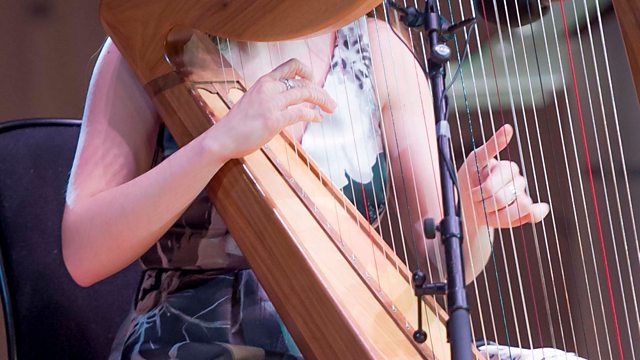
Episode 3
Catrin Finch's travels take her to new territories, as she talks about her collaboration with kora player Seckou Keita and shows how the harp is moving in many new directions.
One of our oldest instruments, the harp has a long and noble history attached to it. From ancient Egypt, to troubadours and princely courts, the harp has held audiences captive over centuries. The harp has constantly evolved and adapted as a response to changing musical environments, from something that existed in almost every ancient culture, to a versatile and sophisticated instrument. Instantly recognisable, the concert harp's gilded beauty proudly announces its presence, yet beyond the glamour of its appearance, and a prominent position in the modern orchestra, it remains still one of the least well known instruments in the classical world.
As a touring musician, Catrin Finch has encountered music from the classical world and a host of other traditions. All of them have helped to shape her thinking and her knowledge of her instrument. In this three-part series the acclaimed virtuoso shares her insights, taking us on a surprising and a very personal journey.
Catrin’s passionate about pushing the boundaries of what the harp can sound like, and taking it into new territory. In the third part of her series she celebrates the eclecticism of her instrument, and she looks at the work of others who are doing the same. She talks about her remarkable collaboration with kora player Seckou Keita, and we discover how through their work together, her musicianship has evolved in a completely new direction. We hear how the harp has moved successfully into jazz, and how folk musicians are finding a new musical language in a traditional setting. At the cutting edge of experimentalism, we find the harp being pushed to its limits by harpist Rhodri Davies, and we hear how Philip Glass's music is finding new audiences through Lavinia Meijer’s recordings.
With music from:
Glass, arr Meijer: Etudes no 9
Lavinia Meijer, harp
Hubbard: Little Sunflower
Dorothy Ashby, harp
Orchestra conducted by Richard Evans
Metheny, Mays: “James”
Catrin Finch, harp
City of Prague Philharmonic Orchestra,
Jody K Jenkins, percussion,
Laurence Cottle, bass guitar,
Jody Jenkins, Paul Clarvis, percussion
Karl Jenkins, conductor
Caplet: Conte fantastique
Emanuel Ceysson, harp
Quatuor Voce
Finch, Keita: Clarach
Seckou Keita, kora
Catrin Finch, harp
Maya Youssef: Bombs turn into roses
Maya Youssef qanun
Barney Morse-Brown, cello
Sebastian Flaig, percussion
Berio: Sequenza II for harp
Frédérique Cambreling, harp
Trad, arr. Calan: Yr Eneth Ga’dd ei Gwrthod
Calan
Sally Beamish: Seavaigers
I: Storm
Catriona Mackay , harp
Chris Stout, fiddle
Scottish Ensemble
Each clear and sudden drop is itself
Rhodri Davies, harp
Carlos Rojas: Quita pesares
�侱��������ó��
Catrin Finch, harp
Producer Johannah Smith for ����ý Wales
Last on
More episodes
Previous
Next
You are at the last episode
Music Played
-
![]()
Philip Glass
Etude No 9 arr for harp by Meijer
Performer: Lavinia Meijer.- SONY : 88985351432.
- SONY.
- 5.
-
![]()
Lyle Mays
James
Composer: Pat Metheny. Performer: Catrin Finch. Performer: Jody Karl Jenkins. Performer: Laurence Cottle. Performer: Paul Clarvis. Orchestra: The City of Prague Philharmonic Orchestra. Conductor: Karl Jenkins.- SONY : SK-87320.
- SONY.
- 3.
-
![]()
André Caplet
Conte Fantastique
Performer: Emmanuel Ceysson. Ensemble: Quatuor Voce.- APARTE : AP-179.
- APARTE.
- 2.
-
![]()
Catrin Finch & Seckou Keita
Clarach
- SOAR.
- bendigedig.
- 1.
-
![]()
Maya Youssef
Bombs turn into Roses
- HARMONIA MUNDI : HMM 902349.
- HARMONIA MUNDI.
- 2.
-
![]()
Luciano Berio
Sequenza II for harp
Performer: Frédérique Cambreling.- DG 457 038-2.
- DG.
- 2.
-
![]()
Calan
Yr Eneth Ga'dd ei Gwrthod
- Solomon.
- Sain Records.
- 8.
-
![]()
Sally Beamish
Seavaigers (Storm)
Performer: Catriona McKay. Performer: Chris Stout. Ensemble: Scottish Ensemble.- McKAY STOUT MUSIC : MSM-002CD.
- McKAY STOUT MUSIC.
- 1.
-
![]()
Catrin Finch & Cimarron
Quita Pesares
- ASTAR ARTES : AARCDA001.
- ASTAR ARTES.
- 11.
Broadcast
- Sun 23 May 2021 23:00����ý Radio 3

